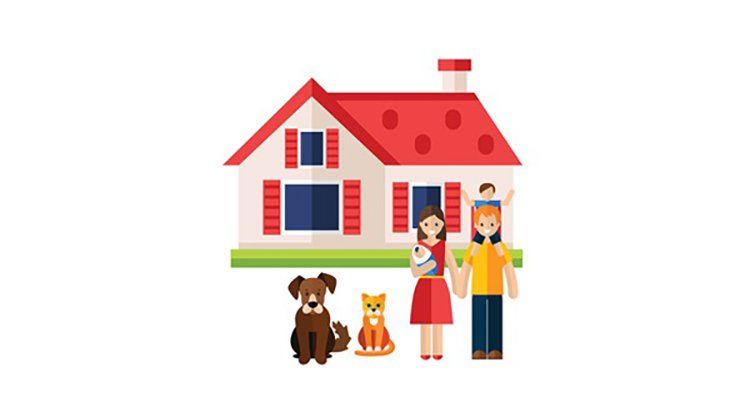Blog Layout
3 Reasons This is NOT the 2008 Real Estate Market
Alex Rossman • Oct 21, 2019
3 Reasons This is NOT the 2008 Real Estate Market

No one knows for sure when the next recession will occur. What is known, however, is that the upcoming economic slowdown will not be caused by a housing market crash, as was the case in 2008. There are those who disagree and are comparing today’s real estate market to the market in 2005-2006, which preceded the crash. In many ways, however, the market is very different now. Here are three suppositions being put forward by some, and why they don’t hold up.
SUPPOSITION #1
A critical warning sign last time was the surging gap between the growth in home prices and household income. Today, home values have also outpaced wage gains. As in 2006, a lack of affordability will kill the market.
Counterpoint
The “gap” between wages and home price growth has existed since 2012. If that is a sign of a recession, why didn’t we have one sometime in the last seven years? Also, a buyer’s purchasing power is MUCH GREATER today than it was thirteen years ago. The equation to determine affordability has three elements: home prices, wages, AND MORTGAGE INTEREST RATES. Today, the mortgage rate is about 3.5% versus 6.41% in 2006.
SUPPOSITION #2
In 2018, as in 2005, housing-price growth began slowing, with significant price drops occurring in some major markets. Look at Manhattan where home prices are in a “near free-fall.”
Counterpoint
The only major market showing true depreciation is Seattle, and it looks like home values in that city are about to reverse and start appreciating again. CoreLogic is projecting home price appreciation to reaccelerate across the country over the next twelve months.
Regarding Manhattan, home prices are dropping because the city’s new “mansion tax” is sapping demand. Additionally, the new federal tax code that went into effect last year continues to impact the market, capping deductions for state and local taxes, known as SALT, at $10,000. That had the effect of making it more expensive to own homes in states like New York.
SUPPOSITION #3
Prices will crash because that is what happened during the last recession.
Counterpoint
It is true that home values sank by almost 20% during the 2008 recession. However, it is also true that in the four previous recessions, home values depreciated only once (by less than 2%). In the other three, residential real estate values increased by 3.5%, 6.1%, and 6.6%.
Price is determined by supply and demand. In 2008, there was an overabundance of housing inventory (a 9-month supply). Today, housing inventory is less than half of that (a 4-month supply).
Bottom Line
We need to realize that today’s real estate market is nothing like the 2008 market. Therefore, when a recession occurs, it won’t resemble the last one.

By Alex Rossman
•
27 Apr, 2020
Managing Your Real Estate Business in the Midst of COVID-19 As the coronavirus pandemic continues to take hold around the world, the thought of how it’s going to affect the U.S. real estate industry is probably foremost in your mind. What are your options as a realtor? What happens to mortgages? How will buyers and sellers react? And how are you going to conduct your business online now that most of us are staying at home due to the COVID-19 pandemic? Let’s take a look at the situation so far and at what you can do to successfully navigate the U.S. real estate market in the time of COVID-19. A brief backgrounder on COVID-19 Coronavirus 2019, popularly referred to as COVID-19, is an infectious disease caused by the novel coronavirus called SARS-CoV-2. The outbreak started out in Wuhan in Hubei Province in China and eventually spread to different countries. Because of the global spread and the continuous rise in the number of infected people, it has been characterized as a pandemic by the World Health Organization (WHO). One of the most challenging things about COVID-19 is its high infectivity rate. Another complication is that although some infected people manifest symptoms (such as fever, shortness of breathing, and dry cough), others with COVID-19 are completely asymptomatic. This makes it harder for health professionals to monitor the transmission. This is why everyone is encouraged to stay home and practice social distancing. What are the latest updates? As of April 6, 2020, all 50 states have reported cases of coronavirus transmission. There is a total of 330,891 cases as of the time of writing, with total deaths recorded at 8,910. New York has the highest number of cases, followed by New Jersey, Michigan, California, and Louisiana. Since the likelihood of community transmission is high, the number of infected people is expected to rise over the following days and weeks. You will find the latest updates on U.S. cases at the CDC’s website: https://www.cdc.gov/coronavirus/2019-ncov/cases-updates/cases-in-us.html For global cases updates, check out Johns Hopkins University’s dashboard at https://coronavirus.jhu.edu/map.html. The economy and the coronavirus crisis Current public health measures in place to combat the transmission of COVID-19 are taking their toll on the economy. According to a study by S&P Global, the coronavirus outbreak in the United States will most likely peak in May. A u-shaped recovery is expected to take place sometime during the second half of the year. This, however, depends on how long the virus will last in the country. There is also no saying just how long the recovery period will last. What we’ve learned from past recessions The “trickle down” approach doesn’t always work. In the 2008 recession, the federal government released a massive stimulus package to reenergize the U.S. economy. It was first given to the banks and big corporations under the mistaken assumption that they would help ensure that it would eventually reach the people who needed it the most. As we know, this did not happen. Fortunately, the $2 trillion coronavirus relief bill won’t use the same “trickle down” approach. Not only is it the largest stimulus package in the country’s history, it’s scope is expansive and it is designed to provide direct support to Americans. Those who are eligible can get up to $1,200. Stimulus payments are expected to be deposited by April 17. In addition to stimulus payments, the coronavirus stimulus package includes unemployment benefits that aim to recover 40 to 45 percent of lost income plus $600 additional weekly benefit. Payments for government-held student loans will also be suspended until September 30. As for retirement accounts, the federal government will suspend the required minimum distribution (RDM) rule for the calendar year 2020. Live within your means. Prior to the 2008 recession, home buyers thought it was okay to get the maximum amount a bank would approve for a loan. As a result, many went underwater when the housing bubble burst. These days, buyers are more often advised to factor in all the costs of homeownership. They know that, as a rule of thumb, housing expenses should only take at least 30 percent of borrowers’ income. Don’t panic in case of market fluctuations. When the 2008 recession hit, many investors panicked. Instead of looking at long-term portfolio objectives, they let themselves be ruffled. Some engaged in panic selling, and others simply followed what everyone else was doing. As a result, these investors were unable to recover when the market rebounded in 2009. Don’t stop advertising and marketing during economic slowdowns. Continued marketing and advertising during recessions can result in improved short-term and long-term sales and profits. Case in point: the 1981-1982 recession. According to a study by McGraw-Hill Research, businesses that continued to spend on ads and marketing during the slowdown experienced a 265 percent increase in sales growth when 1985 rolled in. How will COVID-19 affect the real estate industry? With the vast majority of Americans sheltering at home, activity in the country’s real estate industry is expected to slow down — and already has in some areas. The long-term effects, however, are going to vary per sector and market, and will ultimately depend on the overall impact of the coronavirus outbreak on the economy, something that cannot yet be predicted. The housing market So far, the U.S. housing market remains low on the list of the most threatened real estate sectors. Properties in the hospitality industry are the ones that are most affected, especially those located in popular tourist destinations. And when it comes to housing, the second home and luxury markets are the residential real estate industry’s hardest hit sectors. Because of travel restrictions, tougher immigration rules, flight cancellations, and quarantine instructions, the U.S. housing market will also miss the presence of wealthy Chinese buyers. It’s likely California and New York will be most affected as these are the top two markets for Chinese buyers of luxury homes. The coronavirus outbreak will also likely affect the inventory of housing markets across the country. With most workers now staying home and more stay-at-home orders being imposed, businesses continue to shut down. As a result, real estate development and access to construction supplies and other resources will be interrupted. Finally, some real estate platforms have decided to temporarily suspend their iBuyer programs. This includes Zillow, which has decided to stop operating Zillow Offers in 24 markets across the country to follow public health orders. They join other real estate companies, such as Opendoor and Redfin. Real estate and economic experts are hopeful that once virus cases in the United States flatten, businesses and spending will gradually revive. Real estate agents Everyone in the real estate industry is affected by the coronavirus outbreak. As the pandemic progresses, realtors have to adjust their strategies when it comes to showing homes, meeting clients, arranging closings, and so on. The National Association of REALTORS® has already released a guide to help real estate agents conduct their businesses in the time of COVID-19. It includes necessary information and preventative measures to keep prospective buyers, sellers, and realtors from getting infected by the virus. Closing delays are also going to be the new normal during the COVID-19 pandemic. In a growing number of states, real estate contracts now contain a coronavirus addendum/amendment. See the one from the California Association of REALTORS®, for example: https://www.car.org/-/media/CAR/Documents/ Transaction-Center/PDF/Risk-Management/ CVA_3-2020.pdf. We are also likely going to see a rise in the number of eClosings in states that allow it. Mortgages Real estate experts predict that the COVID-19 pandemic will have a significant impact on mortgage rates. According to Freddie Mac, the average rate of the 30-year fixed-rate mortgage dropped to 3.29 percent during the first few weeks of March. Mortgage rates haven’t been this low since 2012. Although mortgage rates falling can pose some problems, current homeowners can take advantage of the continuously dropping rates. Jay Farner, CEO of Quicken Loans, told MarketWatch recently that homeowners can choose to have their mortgages refinanced and, as a result, be able to pay off their loans earlier. “… One of the things we’re talking a lot about is people moving from a 30-year to a lower term, a 20-year or a 15-year, because rates are so low, they can get a payment today at a 15-year that is similar to a payment they would have made four or five years ago on 30-year when rates were in the fives, yet they could pay their home off in 15 years for far less interest.” (Read the entire interview here.) Farner also believes it highly unlikely for 30-year fixed-rate mortgage rates to drop below 3 percent. If anything, it’s not impossible for mortgage rates to rise sooner than expected. How to survive the coronavirus recession Although the coronavirus will certainly have a significant impact on the real estate industry, there are still plenty of things realtors like you can do to keep your business afloat and emerge stronger once this is all over. Here are some tips and relevant information to help you attract potential clients and maintain your current clientele all while observing social distancing and other public health measures. Create and nurture relationships through social media Health officials may be encouraging social distancing, but that doesn’t apply to social media. And now that most of us are staying at home, we’re spending more time on social media in general. Attract new clients, keep in touch with your current ones, and maintain your reputation as a trusted realtor and real estate resource using your social media pages. Keep your followers updated with the latest real estate market news, supply them with helpful lifestyle tips, provide the latest community updates. If you receive any questions, answer them. When this all passes and things start going back to normal, it will be much easier for you to reconnect with prospective buyers and people interested in selling their homes. Beef up listing info Even if the world seems to have taken a break because of the coronavirus disease, there are still plenty of interested home buyers out there, looking for their dream homes. Showings may no longer be possible in much of the country, but all doors are open online. Add more information to seller clients’ listings to give buyers a better idea about the property’s features. Include more pictures of areas of the home that buyers would normally look at during showings (closet spaces, the views from the windows, the entire exterior, etc.). Well-written copy and captions will also help make a listing stand out. Keep your real estate blog running The limited number of characters you have on social media profiles is hardly enough to share a lot of information. If you have more real estate tips, advice, and community news to share, keep updating your real estate blog regularly. You’ll not only solidify your position as the go-to realtor and real estate resource in your local market, you’ll also be helping your neighbors by sharing timely, relevant information. Sharing the links to your blogs on social media platforms can also help you generate and nurture leads. Include virtual tours in your marketing efforts Virtual tours aren’t new, but not every agent has them for their listings. Virtual tours are especially helpful at this time. As people are encouraged to stay at home, it can be tricky if not impossible to go and look at a property in person. With a virtual tour, a buyer can have a look around a property as if they’re on a private showing, but without ever leaving their own home. Commissioning a professional photographer and videographer to come to a property for sale is still possible even with the social distancing guidelines. Just make sure to observe quarantine measures in place. Get updated on eClosings If you haven’t already, now is definitely the time to understand what options are available in terms of digital real estate closings (if they’re already permitted in your state, that is). Remote online notarization laws vary by state so it’s best to consult with a lender/title company/settlement agent to know what the regulations are so you can better advise your clients. These tips aren’t just handy right now as we work together to overcome the coronavirus outbreak. Bear these in mind as well when you’re future-planning for your business post-coronavirus. All this will eventually pass Here are key takeaways to remember: COVID-19 is easily transmitted via person-to-person contact. Public health measures such as quarantines, stay-at-home orders, and social distancing are necessary to slow the speed of transmission and help ensure that health services do not get overwhelmed. Tourist-driven sectors are taking the biggest blows. In real estate, the second home and luxury markets are taking the most hits. Real estate development and construction are impacted as supply lines and resources are cut by lockdowns and business shutdowns. Mortgage rates have dropped to an all-time low of 3.29 percent. Refinancing might be an option for homeowners who want to pay off their loans faster. Realtors will now have to conduct most of their business online. They should keep their social media pages and website active. Real estate property tips, virtual tours, and comprehensive listing information will help potential buyers find new homes even in isolation. What do we do next? Stay vigilant. Keep yourself up-to-date on the latest news about the COVID-19 pandemic in the United States. Follow local health guidelines and practice social distancing. And as realtors, be flexible, plan ahead, and don’t forget to factor in delays. Help your clients explore their options in the best way you can. How can Realtor Social help you? We provide a full suite of realtor services that can help support your business. Get in touch anytime. We’re here to help you boost your business and stay connected with your clients.

21 Oct, 2019
Some Highlights: The National Association of REALTORS® surveyed their members for the release of their Confidence Index. The REALTORS® Confidence Index is a key indicator of housing market strength based on a monthly survey sent to over 50,000 real estate practitioners. Practitioners are asked about their expectations for home sales, prices, and market conditions. Homes across the country are selling quickly, in an average of just 31 days. 49% of homes sold in less than a month.

By Alex Rossman
•
21 Oct, 2019
In today’s market, low inventory dominates the conversation in many areas of the country. It can often be frustrating to be a first-time homebuyer if you aren’t prepared. Here are five tips from realtor.com’s article, “How to Find Your Dream Home—Without Losing Your Mind.” 1. Get Pre-Approved for a Mortgage Before You Start Your Search One way to show you’re serious about buying your dream home is to get pre-qualified or pre-approved for a mortgage. Even if you’re in a market that is not as competitive, understanding your budget will give you the confidence of knowing whether or not your dream home is within your reach. This will help you avoid the disappointment of falling in love with a home well outside your price range. 2. Know the Difference Between Your ‘Must-Haves’ and ‘Would-Like-To-Haves’ Do you really need that farmhouse sink in the kitchen to be happy with your home choice? Would a two-car garage be a convenience or a necessity? Before you start your search, list all the features of a home you would like. Qualify them as ‘must-haves’, ‘should-haves’, or ‘absolute-wish list’ items. This will help you stay focused on what’s most important. 3. Research and Choose a Neighborhood Where You Want to Live Every neighborhood has unique charm. Before you commit to a home based solely on the house itself, take a test-drive of the area. Make sure it meets your needs for “amenities, commute, school district, etc. and then spend a weekend exploring before you commit.” 4. Pick a House Style You Love and Stick to It Evaluate your family’s needs and settle on a style of home that will best serve those needs. Just because you’ve narrowed your search to a zip code doesn’t mean you need to tour every listing in that vicinity. An example from the article says, “if you have several younger kids and don’t want your bedroom on a different level, steer clear of Cape Cod–style homes, which typically feature two or more bedrooms on the upper level and the master on the main.” 5. Document Your Home Visits Once you start touring homes, the features of each individual home will start to blur together. The article suggests keeping your camera handy and making notes on the listing sheet to document what you love and don’t love about each property you visit. Bottom Line In a high-paced, competitive environment, any advantage you can give yourself will help you on your path to buying your dream home.
OFFICES
Realtor Social - LA817 S Los Angeles St. # 4FLos Angeles, CA 90014
Realtor Social - PDX5200 SW Meadows Rd Suite 150Portland, OR 97035
Facebook & Google Partners
 Write your caption hereButton
Write your caption hereButton
Slide title
Write your caption hereButton

